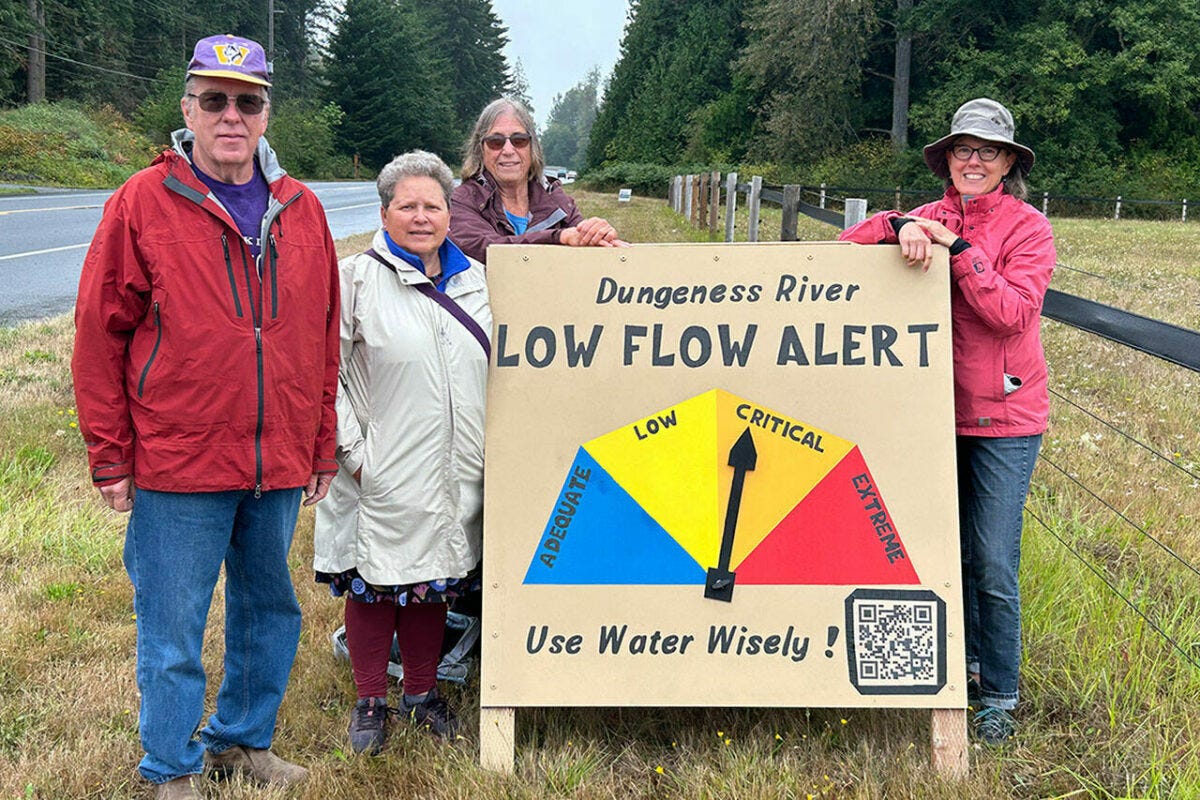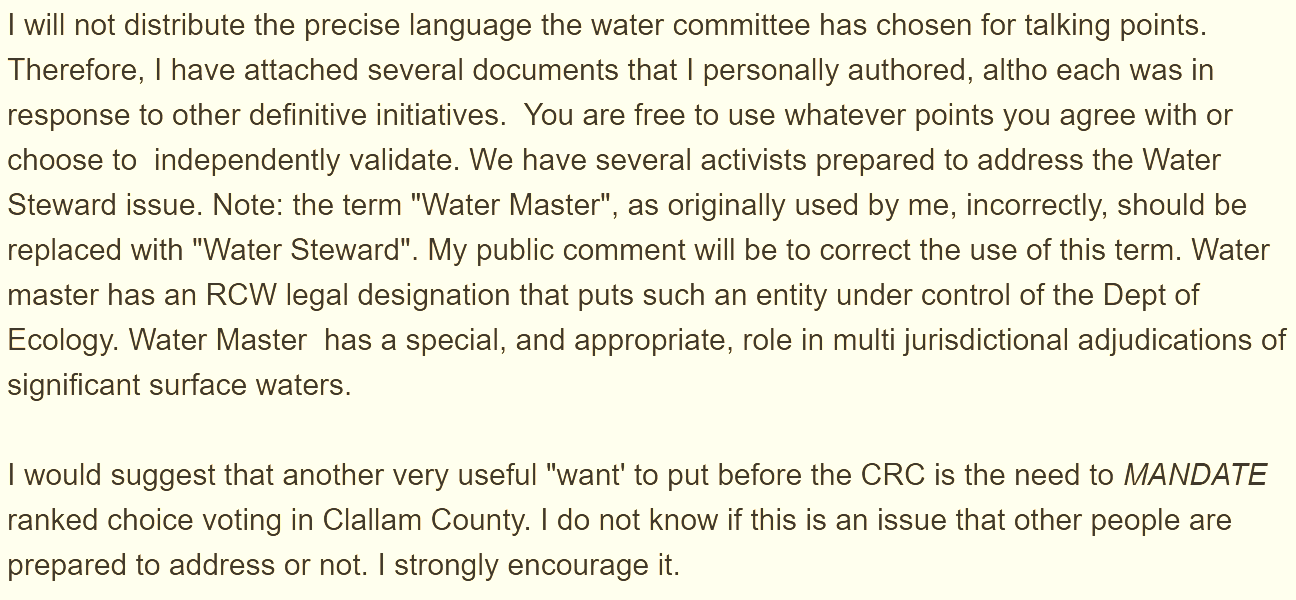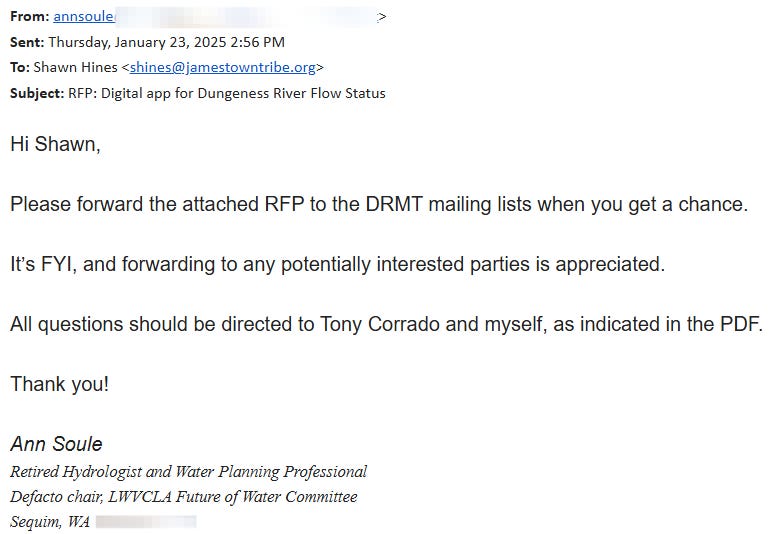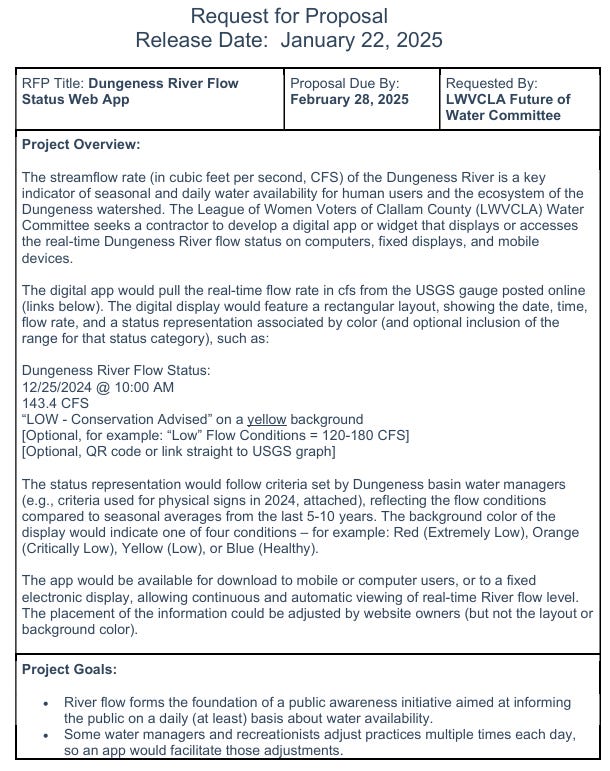Personal agenda or public interest?
Transparency in question as Charter Review agendas take shape
As the Clallam County Charter Review Commission nears its deadline to submit ballot measures, concerns about transparency are growing. Controversial rules limiting commissioners' speech and the swift prioritization of a “Water Steward” role backed by the League of Women Voters raise questions about hidden agendas. With critical decisions ahead, can the CRC regain public trust and truly represent the people of Clallam County?
The Clallam County Charter Review Commission (CRC)—a citizen-elected body tasked with reviewing and recommending changes to the county's “constitution”—may have started slow, but it's now moving swiftly. Unfortunately, it’s moving in a direction that raises significant concerns about transparency, fairness, and public inclusion.
On Thursday evening, the CRC’s Rules and Bylaws Committee spent two hours discussing a proposed rule aimed not at censorship of the public, but at restricting the speech of commissioners themselves—particularly those who publish content online, such as Substack writers.
The committee repeatedly cited claims of “attacks,” “intimidation,” “retaliation,” and “harassment” stemming from Clallam County Watchdog. The only evidence to support these claims came from an anonymous email submitted to the CRC hours before the Bylaws Committee meeting.
Chairwoman Fisch said that the author of the email did not want to identify themselves because “Jeff Tozzer has knowingly bred resentment among his subscribers” and that the person who sent the email feared retaliation. The anonymous email also referred to subscribers as “racial commenters” while praising Fisch. Regardless, the committee voted in favor of adding the following language:
To encourage the public to provide comments to the Charter Review Commission, when making public statements (orally, in printed publications, or electronically) Commissioners shall refrain from identifying public commenters by name, appearance, address, employer, occupation, or affiliation with any organization.
In practical terms, this means a commissioner who is also a journalist would be permitted to write about public comments—but not name the individuals making them, despite such comments being part of the public record. This attempt to shield public speakers from scrutiny or accountability is being framed as a protection—but it’s also a muzzle, and it passed the committee with support from Commissioners Susan Fisch, Chris Noble, and Christy Holy. One commissioner, me, voted in opposition.
The full CRC is expected to vote on this proposed rule at its next meeting: Monday, April 14, at 5:30 p.m. in Room 160 of the Clallam County Courthouse.
Agendas before input?
The CRC has held six meetings so far, and only eight remain before the deadline to submit potential charter amendments for the November ballot. But key public input tools—like the long-promised public questionnaire—are still missing. This survey is supposed to help identify what residents believe should be prioritized. Yet, even without that data, the CRC has already begun forming committees around specific initiatives.
The “Coroner Committee” is an understandable priority, as a recent change in state law has left a mismatch between county charter and state requirements. But the formation of a “Water Steward” committee is more questionable—particularly given how fast it has advanced compared to more popular topics like ethics reform.
Who’s really steering the CRC?
The concept of a Water Steward—effectively a “Water Czar” position within county government responsible for managing water resources not on sovereign land—is being pushed despite the presence of numerous organizations already managing and monitoring water, such as the Department of Ecology, Dungeness River Management Team, the Jamestown Tribe, Clallam Conservation District, PUD, Washinton Water Trust, Fish and Wildlife, Stockholm Environmental Institute, North Olympic Land Trust, Dungeness Water Exchange, North Olympic Development Council, North Olympic Lead Entity for Salmon, Puget Sound Partnership, Ten-thousand-years Institute, Washington State University Extension, various irrigation groups, and several other nongovernmental organizations (NGOs). Clallam County, currently facing staffing cuts due to budget shortfalls, would be required to create another position.
Much of this effort seems to be coming from the League of Women Voters of Clallam County (LWVCLA), which installed a “Low Flow Alert” sign on Old Olympic Highway last year. Retired hydrologist and LWV member Ann Soule helped lead the unveiling and continues to advocate for water-related oversight.

In January, Soule and Sequim resident Tony Corrado emailed Jamestown Tribe Watershed Planner Shawn Hines about developing a digital app to monitor Dungeness River flow levels. The effort, labeled under the LWVCLA Future of Water Committee, shows how the League has positioned itself as a major voice in water policy discussions.
The LWVCLA website features a tab labeled “Water Study” to educate the community about water challenges. There, the public can view a presentation by Ann Soule titled How Our Water System Works: The Hydrology of the Dungeness Watershed, along with a lecture called Tribal Water Rights and History: From Time Immemorial, presented by Hansi Hals, the Natural Resources Director of the Jamestown Tribe.
Make it “real quick”
A day before the CRC’s Sequim Town Hall, an email was circulated prepping activists to speak on behalf of the Water Steward initiative. The email—sent by Corrado—included recommended talking points and encouraged public pressure. Corrado also advocated for introducing ranked-choice voting, suggesting the LWV may be pursuing a broader policy agenda through the CRC.

At the Town Hall, CRC Chair Susan Fisch—who also serves as Secretary of the LWVCLA—gave generous time to LWV member Ann Soule, who advocated for the Water Steward position, while simultaneously instructing other commissioners not to engage with the public or answer clarifying questions. Public commenters who were not aligned with LWV priorities were told to make it “real quick” if they exceeded their three-minute limit. Fisch adjourned the Town Hall one hour early.
Where’s the public voice?
So far, more than 30 potential charter amendments have been mentioned in public comments. But only 25 have made it to the CRC's internal spreadsheet—some, such as a requirement to notify the Bureau of Indian Affairs about adverse impacts, were removed by the Outreach Committee without full commission approval. Another proposed amendment would require federal oversight for any Clallam County partnership with a foreign government—also removed.
One of the most popular items at Town Halls—ethics reform—was ranked second overall when commissioners voted on their top 10 priorities. Yet, no ethics committee has been formed. Meanwhile, the “Water Steward” item, which received fewer votes and less community attention, already has its own dedicated committee.
How is this possible? Perhaps because of who’s leading the charge.
The clock is ticking
With limited time left and critical decisions to make, the CRC should be serving as a conduit for the public’s will, not as a platform for advancing personal or political agendas. Yet, it's hard to ignore the appearance that some commissioners came to this role with their minds already made up—and that the CRC is drifting away from its intended purpose: empowering the people of Clallam County to shape their own government.
Transparency, fairness, and public trust must be restored—before it's too late.
The last “Town Hall” is next week
The final scheduled Town Hall for the Charter Review Commission is set for Monday, April 7, from 6–8 p.m. at the Crescent Grange in Joyce (50724 Highway 112, Port Angeles, WA). Commissioner Jim Stoffer has indicated he may allow more open dialogue between Commission members and the public, making this an important opportunity to share your views on what you want from county government.
This is considered the “District 3 Town Hall,” serving the west end. However, it’s worth noting that the location is less than 20 minutes from District 2, but over an hour from Forks and roughly 80 minutes from Neah Bay—a long trip for much of District 3’s population.









Attempts to block journalists from identifying comments and commenters in public forums have been held by the courts as wholly specious. In other words, you have no right to privacy if you speak up in public meetings, either as public official or a member of the public who offers comment. Been there, done that, been through that kind of lawsuit in my career.
I've watched CRC meetings by video. It's interesting how the panel has had county officials attend to help flush out details, especially when it comes to the coroner matter. The details are important, and also what will take time to move anything to the BOCCC for approval, or to ballot for a vote.
I don't recall a county official giving any color to the Water Steward/Czar position, but for some reason Water Activist sounds more appropriate given the way this is coming about unless someone starts spilling the beans what this person would actually do. I'll take a stab at this. It'll be sent to the BOCC vs going to the voters for a vote to be approved.
The switch from a 3 to 5-person BOCCC will cost the county additional money, that given the tight budget will add financial strain to the citizens, but I support that because it's a cost spread out among all citizens to equally represent all, in a better way. Adding a Water Activist person will cost the county additional money, but not equally serve everyone despite burdening everyone. I'm against the Water Activist position because I'm concerned that it'll be used for agenda driven ideology.
The ranked voting matter is also something I'm against. It is known to be confusing, and disenfranchising to certain segments of society based on information I found online. With an aging population, the last thing we need to do is confuse our voters more, or to inhibit others from voting. I urge people to speak against this measure, and this at a minimum needs to be done in writing, or in person by attending a CRC meeting either remotely or in person.